Administrative Machinery in India | Political Science - Personnel Administration | 12th Political Science : Chapter 6 : Administrative Machinery in India
Chapter: 12th Political Science : Chapter 6 : Administrative Machinery in India
Personnel Administration
Personnel Administration
Concept of Personnel Administration
The task of personnel administration is to, assure
a steady source of people who can contribute to the success of an organization
and meet the growing demands of development. TO understand the concept of
personnel administration, it is very essential to first understand the meaning
and nature of the term.
Personnel Administration aims at:
v Effective utilisation
of human resources
v Desirable working
relations among all members of the organisation
v Maximum development
v Meeting the
organisation’s social and legal responsibilities.
Scope of Personnel Administration
Personnel administration incorporates all aspects
of management of persons in organization. The primary objective of personnel
administration, is to ensure effective utilization of human resources in
pursuit of organizational goals. The personnel administration departments should
design and establish an effective working relationship among all the members of
an organization by division of organizational tasks into jobs, defining clearly
the responsibility and authority for each job and its relation with other jobs
in the organization. Personnel administration must try to enthuse among the
employees feelings of commitment, involvement and loyalty to the organization.
The aim is to create cordial relations among the employees and do away with
frictional situations arising out of personal jealousies, rivalries and
prejudices. Personnel administration also has to curb unfavorable practices
like favoritism and nepotism in an organization.
Functions of Personnel Administration
Some of the important functions of personnel
administration are :
a) Manpower Planning
b) Recruitment
c) Training
d) Promotion
e) Salary structuring
f) Employees’ welfare
1. Civil Services – Meaning and Features
Advantages of having an independent, permanent and
impartial civil service are as follows:
i)
A credible recruitment process through an impartial
agency provides a defense against such abuse.
ii) A permanent civil service provides continuity
and develops expertise as well as institutional memory for effective policy
making.
iii) A permanent and impartial civil service is
more likely to assess the long-term social payoffs of any policy whereas the
political executive may have a tendency to look for short term political gain.
iv) A permanent civil service helps to ensure
uniformity in public administration and also acts as a unifying force
particularly in vast and culturally diverse nations.
v) A permanent civil service like any other
reputable profession is likely to evolve over time an ethical basis for its
functioning.
2. All India Services, Central Services and State Services
A unique feature of the Indian Administration
System, is the creation of certain services common to both - the Centre and the
States, namely, the All India Services. These are composed of officers who are
in the exclusive employment of neither Centre nor the States, and may at any
time be at the disposal of either. The officers of these Services are recruited
on an all- India basis with common qualifications and uniform scales of pay,
and notwithstanding their division among the States, each of them forms a
single service with a common status and a common standard of rights and
remuneration.
Like other federal polities, the Centre and the
constituent states, under the Indian Constitution, have their separate public
services to administer their respective affairs. Thus, there are Central or
Union Services to administer Union subjects, like defence, income tax, customs,
posts and telegraphs, railways, etc. The officers of these Services are
exclusively in the employment of the Union Government. Similarly, the States
have their own separate and independent services.
All India Services
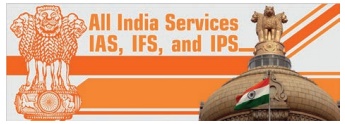
The Constitution provides for the creation of All
India Services (AIS) common to the Union and the States. The All India Services
Act, 1951 provides that the Central Government may make rules for regulating
the recruitment and the conditions of service of persons appointed to the All
India Services. Presently only the IAS, the IPS and the IFS (Indian Forest
Service) have been constituted as All India Services. Recruitment to these
services is made under the corresponding AIS Recruitment Rules and may be done
by Direct Recruitment (through Competitive Examinations) and by promotion from
the State Service . The AIS Branch is concerned with the latter mode of
recruitment which is governed by the respective IAS/IPS/IFS Promotion
Regulations.
What are the different modes of recruitment to the All India Services?
There are two modes of recruitment to the All India
Services;
(i) Direct Recruitment: Through the Civil Services
Examination for IAS and IPS and the Indian Forest Service Examination for the
IFS. These Examinations are conducted by UPSC.
(ii) Promotion/Selection: By way of promotion of
the SCS/SPS/SFS officers to the respective All India Service and by way of
selection of Non-State Civil Services (NSCS) Officers to the IAS.
Indian Administrative Service
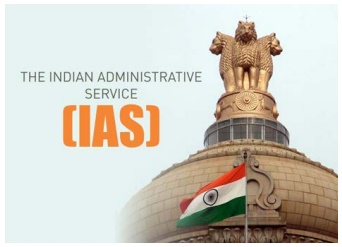
The Indian Administrative Service (IAS) is the
direct descendant of the old Indian Civil Service. As an all India service, it
is under the ultimate control of the Union Government, but is divided into State
cadres, each under the immediate control of a State Government. The salary and
the pension of these officers are met by the States. But the disciplinary
control and imposition of penalties rest with the Central Government which is
guided, in this respect, by the advice of the Union Public Service Commission.
On appointment, the officers are posted to different State cadres. The strength
of each State cadre, however, is so fixed as to include are serve of officers
who can be deputed for service under the Union Government for one or more
‘tenures’ of three, four or five years before they return to the State cadre.
The majority of individual officers have an opportunity of serving at least one
spell of duty under the Union Government; many have more than one such spell.
The practice of rotating senior officers in and out of the Secretariat position
is known in official parlance as the tenure system.
Another distinctive feature of this Service is its
multi-purpose character. It is composed of ‘generalist administrators’ who are
expected, from time to time, to hold posts involving a wide variety of duties
and functions.
Indian Police Service
The Indian Police Service is an original all India
Service (it had pre-in dependence origins) which differs from the IAS in two ways:
(i) most of the officers in this service work only in the state since there are
only a few police posts at the Centre and (ii) its pay scale and status are lower
than those of the IAS. The officers of the IPS are recruited from the same
unified All India Civil Service examination. Recruits to the IPS are first
given a five months foundational training and later special training at the
Sardar Patel National Police Academy, Hyderabad. The subjects of the study and
the training is drill, handling of weapons, etc., which have a direct bearing
on the normal work of a police officer. The syllabus of training includes
studies of crime psychology, scientific aids in detection of crime, methods of
combating corruption and emergency relief. After completing a year’s training,
the probationer passes an examination conducted by the UPSC. He is, then
appointed as an Assistant Superintendent of Police. But, before this appointment
he has to undergo a year’s programme of training; he is given practical
training which requires him to do the work of various subordinate officers. It
is only after this that he is appointed an Assistant Superintendent of Police.
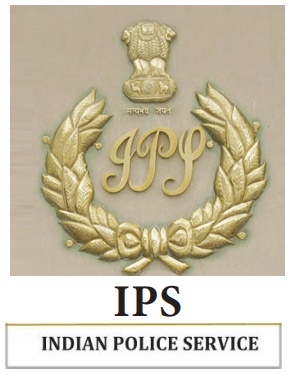
As an all India Service it is under the ultimate
control of the Union Government, but is divided into state cadres, each under
the immediate control of a State Government. The Indian Police Service is
managed by the Ministry of Home Affairs.
Indian Forest Service
The Indian Forest Service is the only all India
Service that has been set up after independence. It became operational by an
Act of Parliament in 1963. Its pay scale and status is lower than that of the two
original all India Services - the IAS and the IPS. Its recruits are chosen from
an exclusive examination conducted by the Union Public Service Commission,
which consists of a written test and interview. Though it is an All India
Service, its nature is not that of a generalized civil service, but is
specialized and functional. It is managed by the Department of Personnel and
Administrative Reforms which is in charge of making rules of recruitment,
discipline and conditions of service regarding all India Services.
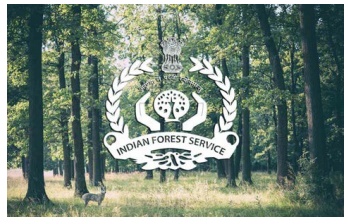
After selection the appointees undergo a
foundational course lasting three months along with successful candidates of
the other all India and Central Services. After the foundation course, the
probationers move to their own Academy (Indian Forest Institute) at Dehradun
for a rigorous two year training course, the end of which they have to pass an
examination before final posting. The Indian Forest Service is cadre-based as
in the case of other All India Services. Like all other All India Services, a
member of this Service can come to the Centre on deputation but has to go back to
his cadre after the period of deputation is over.
The Indian Foreign Service (IFS)
The Indian Foreign Service comes under Central
Civil Service - Class I and was created after Independence. It is under the
exclusive control of the Central Government and its members are recruited from
the top few positions of the All India Civil Services examination. Among the
Central Civil Services it is the top most in prestige, status, pay and emoluments
and its recruits are asked, to serve in Indian mission and embassies abroad. It
is managed by the Ministry of External Affairs. Also, involved in the
management of the IFS are the Department of Personnel which determines the
conditions of service and the Ministry of Finance, which is concerned with the
pay scales and other financial aspects of conditions of service. In matters of
allowances, the members of the Indian Foreign Service are more fortunate
compared to other services.
They are entitled to foreign allowance which are
fixed with reference to: (a) local cost of living, (b) other expenditure which
an officer serving abroad necessarily incurs either at home or abroad, over and
above that an officer of corresponding grade serving in India, (c)representational
expenditure, i.e., expenditure which while optional for a private individual is
obligatory for a member of the service resident, by virtue of his official
position.
The recruit of the IFS undergoes a training
programme which covers a period of three years. He is attached to a district
for some time to enable him to pick up contact with practical work, he also undergoes
a period of secretariat training.
3. UPSC- Organization, Powers, Functions and Role
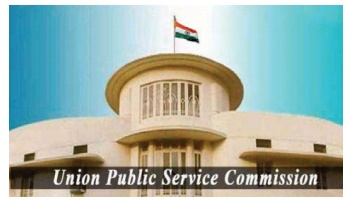
Historical Perspective
The origin of the Public Service Commission in
India is found in the First Dispatch of the Government of India on the Indian
Constitutional Reforms on the 5th March, 1919, which referred to the need for
setting up some permanent office charged with the regulation of service
matters. This concept of a body intended to be charged primarily with the
regulation of service matters, found a somewhat more practical shape in the
Government of India Act, 1919. Section 96(C) of the Act provided for the
establishment in India of a Public Service Commission which should “discharge,
in regard to recruitment and control of the Public Services in India, such
functions as may be assigned thereto by rules made by the Secretary of State in
Council”.
After passing of the Government of India Act, 1919,
in spite of a prolonged correspondence among various levels on the functions
and machinery of the body to be set up, no decision was taken on setting up of
the body. The subject was then referred to the Royal Commission on the Superior
Civil Services in India (also known as Lee Commission). The Lee Commission, in
their report in the year 1924, recommended that the statutory Public Service
Commission contemplated by the Government of India Act, 1919 should be established
without delay.
Subsequent to the provisions of Section 96(C) of
the Government of India Act, 1919 and the strong recommendations made by the
Lee Commission in 1924 for the early establishment of a Public Service
Commission, it was on October 1, 1926 that the Public Service Commission was
set up in India for the first time. It consisted of four Members in addition to
the Chairman. Sir Ross Barker, a member of the Home Civil Service of the United
Kingdom was the first Chairman of the Commission.
The functions of the Public Service Commission were
not laid down in the Government of India Act, 1919, but were regulated by the
Public Service Commission (Functions) Rules, 1926 framed under sub-section (2)
of Section 96(C) of the Government of India Act, 1919. Further, the Government
of India Act, 1935 envisaged a Public Service Commission for the Federation and
a Provincial Public Service Commission for each Province or group of Provinces.
Therefore, in terms of the provisions of the Government of India Act, 1935 and
with its coming into effect on 1st April, 1937, the Public Service Commission
became the Federal Public Service Commission.
With the inauguration of the Constitution of India
in January 26, 1950, the Federal Public Service Commission came to be known as
the Union Public Service Commission, and the Chairman and Members of the
Federal Public Service Commission became Chairman and Members of the Union
Public Service Commission by virtue of Clause (1) of Article 378 of the
Constitution
Organization and Powers
The Union Public Service Commission is a
Constitutional Body established under Article 315 of the Constitution of India.
The Commission consists of a Chairman and ten Members.
The Mandate of Union Public Service Commission Under Article 320 and 321 of the Constitution of India, includes:
Union Public Service Commission is a Constitutional
Body, which has been mandated the responsibilities are as follows: Making
recruitment by conduct of competitive examinations, selection through
interviews, Advising on the suitability of officers for appointment on
promotion and transfer-on-deputation, Advising the Government on all matters
relating to methods of recruitment to various services, Framing and amendment
of Recruitment Rules, disciplinary cases relating to various Civil Services,
Miscellaneous matters relating to grant of extra-ordinary pensions,
reimbursement of legal expenses etc, Advising the Government on any matter
referred to the Commission by the President of India and on the request of the
Governor of a State, to serve all or any of the needs of a State relating to recruitment,
with the approval of the President.
In order to fulfill its Constitutional obligations,
the Commission is supported by Officers/Staff broadly known as Secretariat of
the Commission, headed by the Secretary. The Administrative Branch of the
Commission is entrusted with the functions of administering the Secretariat of
the Commission as well as looking after the personal matters of Hon’ble
Chairman Hon’ble Members and other Officers/ Staff of the Commission.
4. State Public Service Commission
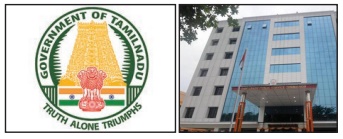
Parallel to the Union Public Service Commission
(UPSC) at the Centre, there is a State Public Service Commission (State Public
Service Commission) in a state. The same set of Articles (i.e., 315 to 323 in
Part XIV) of the Constitution also deal with the composition, appointment and
removal of members, power and functions and independence of a State Public
Service Commission.
Composition
A State Public Service Commission consists of a
chairman and other members appointed by the governor of the state. The
Constitution does not specify the strength of the Commission but has left the
matter to the discretion of the Governor. Further, no qualifications are
prescribed for the commission’s membership except that one-half of the members
of the commission should be such persons who have held office for at least ten
years either under the government of India or under the Government of a state.
The Constitution also authorizes the governor to determine the conditions of
service of the chairman and members of the Commission.
The chairman and members of the Commission hold
office for a term of six years or until they attain the age of 62 years,
whichever is earlier (in the case of UPSC, the age limit is 65 years). However,
they can relinquish their offices at any time by addressing their resignation to
the governor.
The governor can appoint one of the members of the
State Public Service Commission as an acting chairman in the following two circumstances:
a) When the office of the chairman falls vacant; or
b) When the chairman is unable to perform his
functions due to absence or some other reason.
The acting chairman functions till the person
appointed as chairman enters on the duties of the office or till the chairman
is able to resume his duties.
Constitutional Provisions
Article-315 : Public Service Commissions for the
Union and for the States.
Article-316 : Appointment and term of office of
members.
Article-317 : Removal and suspension of a member of
a Public Service Commission.
Article-318 : Power to make regulations as to conditions
of service of members and staff of the Commission.
Article-319 : Prohibition as to the holding of
offices by members of Commission on ceasing to be such members.
Article-320 : Functions of Public Service
Commissions.
Article-321 : Power to extend functions of Public
Service Commissions.
Article-322 : Expenses of Public Service
Commissions.
Article-323 : Reports of Public Service
Commissions.
Removal
Although the chairman and members of a State Public
Service Commission are appointed by the governor, they can be removed only by
the president (and not by the governor). The president can remove them on the
same grounds and in the same manner as he can remove a chairman or a member of
the UPSC. Thus, he can remove him under the following circumstances:
a) If he is adjudged an insolvent (i.e., has gone
bankrupt); or
b) If he engages, during his term of office, in any
paid employment outside the duties of his office; or
c) If he is, in the opinion of the president, unfit
to continue in office by reason of infirmity of mind or body.
In addition to these, the president can also remove
the chairman or any other member of State Public Service Commission for
misbehavior. However, in this case, the president has to refer the matter to the
Supreme Court for an enquiry. If the Supreme Court, after the enquiry, upholds
the cause of removal and advises so, the president can remove the chairman or a
member. Under the provisions of the Constitution, the advice tendered by the
Supreme Court in this regard is binding on the president. However, during the
course of enquiry by the Supreme Court, the governor can suspend the concerned
chairman or member, pending the final removal order of the president on receipt
of the report of the Supreme Court.
Further, the Constitution has also defined the term
‘misbehaviour’ in this context. The Constitution states that the chairman or
any other member of a State Public Service Commission is deemed to be guilty of
misbehavior if he (a) is concerned or interested in any contract or agreement
made by the Government of India or the government of a state, or (b)
participates in any way in the profit of such contract or agreement or in any
benefit there from otherwise than as a member and in common with other members
of an incorporated company.
Independence
As in the case of UPSC, the Constitution has made
the following provisions to safeguard and ensure the independent and impartial
functioning of a State Public Service Commission:
a) The chairman or a member of a State Public
Service Commission can be removed from office by the president only in the
manner and on the grounds mentioned in the Constitution. Therefore, they enjoy
the security of tenure.
b) The conditions of service of the chairman or a
member, though determined by the governor, cannot be varied to his disadvantage
after his appointment.
c) The entire expense including the salaries,
allowances and pensions of the chairman and members of a State Public Service
Commission are charged on the consolidated fund of the state. Thus, they are
not subject to vote of the state legislature.
d) The chairman of a State Public Service
Commission (on ceasing to hold office) is eligible for appointment as the
chairman or a member of UPSC or as the chairman of any other State Public
Service Commission, but not for any other employment under the Government of
India or a state.
e) A member of a State Public Service Commission
(on ceasing to hold office) is eligible for appointment as the chairman or a
member of the UPSC, or as the chairman of that State Public Service Commission
or any other State Public Service Commission, but not for any other employment
under the Government of India or a state.
f) The chairman or a member of a State Public
Service Commission is (after having completed his first term) not eligible for
reappointment to that office (that is, not eligible for second term)
Functions
A State Public Service Commission performs all
those functions in respect of the state services as the UPSC does in relation to
the Central services:
a) It conducts examinations for appointments in the
services of the state.
b) It is consulted on the following matters related
to personnel management:
i) All matters relating to methods of recruitment to
civil services and for civil posts.
ii) The principles to be followed in making
appointments to civil services and posts and in making promotions and transfers
from one service to another.
iii) The suitablility of candidates for
appointments to civil services and posts; for to another; and transfers from
one service to another; and appointments by transfer or deputation. The
concerned departments make recommendations for promotions and request the State
Public Service Commission to ratify them.
iv) All disciplinary matters affecting a person
serving under the government of the state in a civil capacity including
memorials or petitions relating to such matters. These include:
·
Censure (severe disapproval)
·
Withholding of increments
·
Withholding of promotions
·
Recovery of pecuniary loss
·
Reduction to lower service or rank (demotion)
·
Compulsory retirement
·
Removal from service
·
Dismissal from service
v) Any claim for reimbursement of legal expenses
incurred by a civil servant in defending legal proceedings instituted against
him in respect of acts done in the execution of his official duties.
vi) Any claim for the award of a pension in respect
of injuries sustained by a person while serving under the government of the
state and any question as to the amount of any such award.
vii) Any other matter related to the personnel
management.
The Supreme Court has held that if the government
fails to consult the State Public Service Commission in these matters, the
aggrieved public servant has no remedy in a court. In other words, the court
held that any irregularity in consultation with the State Public Service
Commission or acting without consultation does not invalidate the decision of
the government. Thus, the provision is directory and not mandatory.
The additional functions relating to the services
of the state can be conferred on State Public Service Commission by the state
legislature. It can also place the personnel system of any local authority,
corporate body or public institution within the jurisdiction of the State
Public Service Commission. Hence, the jurisdiction of State Public Service
Commission can be extended by an Act made by the state legislature.
The State Public Service Commission presents;
annually, to the governor a report on its performance. The governor places this
report before both the Houses of the state legislature, along with a memorandum
explaining the cases where the advice of the Commission was not accepted and
the reasons for such non-acceptance.
Limitations
The following matters are kept outside the
functional jurisdiction of the State Public Service Commission. In other words,
the State Public Service Commission is not consulted on the following matters:
a) While making reservations of appointments or
posts in favour of any backward class of citizens.
b) While taking into consideration the claims of
scheduled castes and scheduled tribes in making appointments to services and
posts.
The governor can exclude posts, services and
matters from the purview of the State Public Service Commission. The
Constitution states that the governor, in respect to the state services and
posts may make regulations specifying the matters in which, it shall not be
necessary for State Public Service Commission to be consulted. But all such
regulations made by the governor shall be laid before each House of the State
legislature for at least 14 days. The State legislature can amend or repeal
them.
Role
The Constitution visualizes the State Public
Service Commission to be the ‘watchdog of merit system’ in the state. It is
concerned with the recruitment to the state services and advises the
government, when consulted, on promotion and disciplinary matters. It is not
concerned with the classification of services, pay and service conditions,
cadre management, training and so on. These matters are handled by the
Department of Personnel or the General Administration Department. Therefore,
the State Public Service Commission is only a central recruiting agency in the
state while the Department of Personnel or the General Administration
Department is the central personnel agency in the state.
The role of State Public Service Commission is not
only limited, but also recommendations made by it are only of advisory nature
and hence, not binding on the government. It is up to the state government to accept
or reject that advice. The only safeguard is the answerability of the
government to the state legislature for departing from the recommendation of
the Commission. Further, the government can also make rules, which regulated
the scope of the advisory functions of State Public Service Commission.
Also, the emergence of State Vigilance Commission
(SVC) in 1964 affected the role of State Public Service Commission in
disciplinary matters. This is because both are consulted by the government
while taking disciplinary action against a civil servant. The problem arises
when the two bodies tender conflicting advice. However, the State Public
Service Commission, being an independent Constitutional body, has an edge over
the SVC.
Finally, the State Public Service Commission is
consulted by the governor while framing rules for appointment to judiciary
service of the state other than the posts of district judges. In this regard,
the concerned state high court is also consulted.
5. Staff Selection Commission
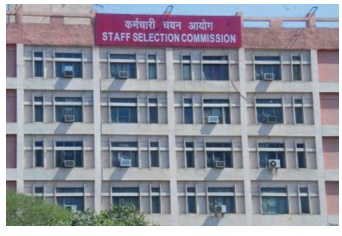
Function of Commission
1. TO make recruitment to (i) all Group “B” posts
in the various Ministries/Departments of the Govt. of India and their Attached
and Subordinate Offices.
2. TO conduct examinations and/or interviews,
whenever required for recruitment to the posts within its purview. The
examinations would be held as far as possible at different centres and
successful candidates posted, to the extent possible, to their home State/ Region.
3. In particular, to hold Open Competitive
Examinations for recruitment to the posts are as follows:
i) Lower Division Clerks in the various
Ministries/Departments.
ii) Grade “C” and Grade ‘D” Stenographers of the
Central Secretariat.
iii) Assistants in the various
Ministries/Departments.
iv) Inspectors of Central Excise
v) Sub-Inspectors in, Central Bureau of
Investigation and Central Police Organisations;
vi) Divisional Accountants, Auditors and
Accountants
vii) Junior Engineer (Civil and Electrical) in CPWD
viii) Statistical Investigators
ix) Tax Assistant
x) Section Officer
xi) Section Officer (Audit)
4. The Commission also holds Departmental
Examination for promotion
i) Lower Divisional Clerks to Upper Divisional
Clerks Grade of the Central Secretariat
ii) Stenographers Grade “D” to Stenographers Grade
“C”
5. The Commission prepares schemes for recruitment to
all Group “B” posts which are in the pay scale of ₹ 9300 to 34800 with a grade pay
of ₹ 42000 or below and Group “C”
non-technical posts in the Ministries/Departmental of the Govt. of India
including its Attached and Subordinate Offices in consultation with the
Departments concerned.
6. The Commission conducts examinations/selections
for recruitment to all Group “B” posts which are in the pay scales the maximum
of which is ₹10,500 or
below and all Group “C” non-technical posts in the Ministries/Departments of
the Govt. from time to time.
7. The Commission performs such other functions as
may be entrusted to it by the Central Govt. from time to time.
Related Topics